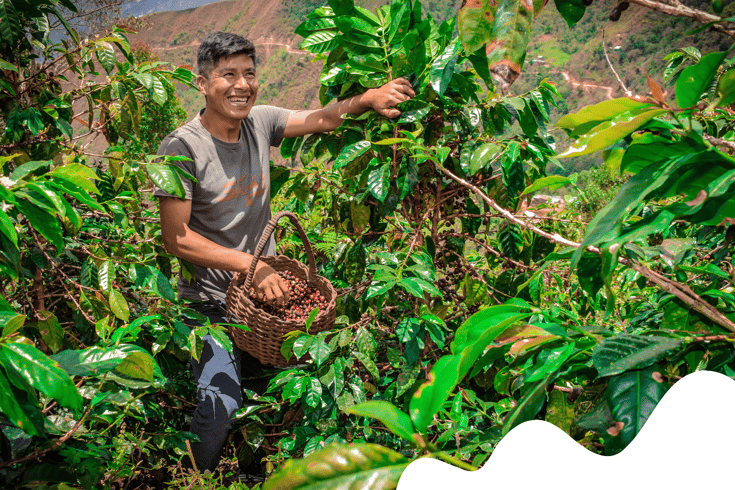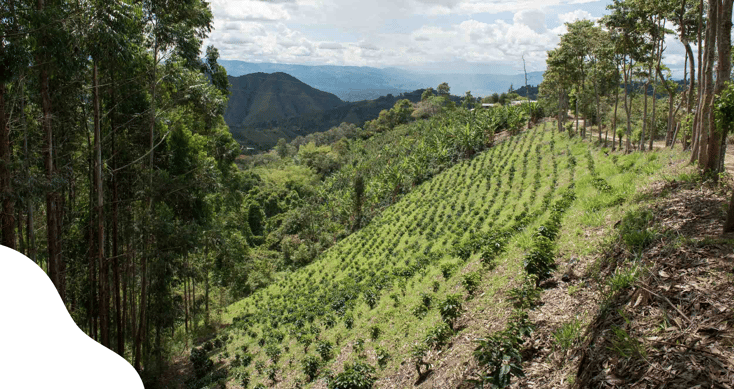
Navigating the coffee market has always been a complex exercise in managing risk carefully and precisely—and it’s never been an easy task. Market uncertainty and price volatility are regular players in any “normal” year, but the past year has certainly been far from the norm. Unfortunately, as you might expect, producers often bear the brunt of the risk, especially smallholder producers who likely don’t have access to the financial means and resources that would help mitigate price volatility.
This is where Fairtrade steps in. Most people know that Fairtrade certification acts as a safeguard for when the ‘C’ price of coffee—that is, the price of coffee globally traded on the New York futures market—falls unsustainably low.
What might be a little less understood is that the price that buyers pay for green coffee isn’t determined by the C-price alone, but is actually a function of a number of different factors. In addition to the C-price, buyers must also take into account origin “differentials,” or localized market prices added onto the C-price which vary from origin to origin and are largely determined by supply/demand and coffee quality, and fluctuations in local currency. Factor into this equation how Fairtrade pricing functions, especially amidst big swings in price as we’ve seen over the past 12 months, and it can understandably be very confusing.
If you’ve been having a rough time getting a sense of the prices you’re paying for Fairtrade coffee this past year, we don’t blame you. So in order to capture a clearer picture of how Fairtrade brings stability in volatile markets, we reached out to our friend Peter Kettler, the Global Product Manager at Fairtrade International, to shed some light on this important topic.
________________________________________________
Hi Peter! Thanks so much for taking the time to help our readers better understand this complex topic. Firstly, can you talk about what happens to Fairtrade prices when the C-price rises?
The Fairtrade minimum price acts as an economic safety net for producers when the C-Market falls to levels that do not meet the cost of sustainable production, much less allow producers to provide food, health care or educational opportunities for their families. It is important to state that the Fairtrade Minimum Price is, as the name says, a minimum price. This means it does not lock producers into selling at that price when market conditions would enable them to receive a higher price.
It is currently set at $1.40/lb. In addition, buyers of Fairtrade certified coffee pay an additional $.20/lb in the form of a Fairtrade Premium. The Fairtrade Premium provides cooperatives with additional funds to undertake a variety of infrastructure improvements or social development projects. This helps them build their capacity to meet the needs of their members and support their communities, as well as insulate them from the most severe effects of any ongoing or future price crisis. In addition, if the coffee is also organic certified, there is an additional $.30/lb applied.
 Colombia is the world's largest supplier of Fairtrade certified coffee.
Colombia is the world's largest supplier of Fairtrade certified coffee.
For example, if a buyer is purchasing a Fairtrade Colombian Huila Supremo when the C-Market is at $1.30/lb, and the differential for Huila Supremo’s is currently at +40, then they would pay $1.70/lb, plus the Fairtrade Premium of $.20/lb for a total of $1.90/lb.
If the C-Market price ever rises to a level above the Fairtrade Minimum Price, say to $1.50/lb, then the buyer would pay $1.50/lb, plus the $.40/lb differential and $.20/lb as Fairtrade Premium, for a total of $2.10/lb.
In either scenario, the buyers agree to pay the Fairtrade Premium, which allows cooperatives to continue to invest in capacity-building programs that will benefit their members when prices again inevitably fall.
What happens to Fairtrade prices when the C-price falls?
Here is precisely where the Fairtrade safety net provided by our minimum price kicks in. For example, in the event that the C-Market dips to $.90/lb, then the buyer would still purchase that Huila Supremo Coffee at $1.40/lb—plus the Fairtrade Premium of $.20/lb—which means that the producer will still get $1.60/pp. This is a difference of $.70/lb in comparison to those that are not Fairtrade certified.
We’ve seen some origins not offering coffees at the Fairtrade minimum price, and this is due to the influence of country differentials. Could you elaborate on some of the factors at play and how market participants should account for country differentials?
There are a wide variety of reasons why a particular country’s differential may rise or fall. Severe weather, currency fluctuations, over/under supply, political unrest, or the outbreak of coffee plant disease are just a few of the factors that come to mind.
COVID-19 has shocked the coffee supply network to lesser or greater degrees depending on a producing county’s restrictions around internal travel, quarantines, lack of rural health facilities or where they might have been in their harvest season at the beginning of widespread lockdowns.
As a result, the industry has witnessed a series of fluctuating price differentials, depending on the availability of coffee in highly-valued regions, shipping interruptions, or simply the fact that there is uncertainty around both the short and long term effects the pandemic will have when it comes to consumers and retail.
"Fairtrade can play a vital role in redefining how trade is conducted, providing an alternative to the mantra of “buy low, sell high” that has dominated our economies for many years. Perhaps the pandemic will allow us to finally examine the high cost of low prices."
In the past few months, differentials for a number of producing regions have risen exponentially, providing at least some temporary relief for producers who have endured an extended period of low market prices, rising input and labor costs, as well as increased health risks.
Following our example from Colombia, a Fairtrade organic certified Supremo may now carry a differential of $1.40/lb or more. If the C-Market continues to hover around $1.25/lb, that would translate into an FOB price of $2.65/lb. Again, it’s worth repeating that Fairtrade sets a minimum price of $1.40/lb, but does not restrict producers from benefiting from current favorable market conditions.
Is there a universally accepted source for country differentials?
Unfortunately, there are no “official’” country differentials established. Price differentials are mostly dependent on historical trends, but almost always reflect what the current “going prices” are. If a major trader decides to purchase a large volume of coffee from a particular region, the differential will increase. Traders should be able to provide their customers with a range of prevailing country differentials at any given time.
Differentials can be a key indicator of market trends and provide insights to assist all supply circle stakeholders in making strategic decisions about when to purchase or sell a particular coffee. During periods of increased market volatility, it is critically important for both buyers and sellers to stay abreast of current differentials, among other factors.
What is the relevance of Fairtrade contracts at a time of rising coffee prices?
When we look at historical coffee pricing charts, we see a downward trend that does not favor producers, especially over the past several years. Fairtrade provides some level of consistency in an increasingly challenging and uncertain world.
On top of the Fairtrade prices, the Fairtrade standards encourage long term relationships with producers, enabling them to better plan ahead. This is critical considering that smallholder producers are facing a perfect storm of challenges that include the accelerating effects of climate change, rapidly decreasing soil fertility rates, youth migration, food insecurity, sustained low prices, increased input costs as well as the demands from the industry, governments and consumers alike for consistently high quality, sustainably produced coffee.
-2.png?width=735&name=DSC00893%20(1)-2.png) Fairtrade premiums are often used towards infrastructure improvements, such as constructing drying beds.
Fairtrade premiums are often used towards infrastructure improvements, such as constructing drying beds.
In addition, Fairtrade standards outline that the Fairtrade payer must make up to 60% of the value of the contract available as pre-financing to the producer at least eight weeks prior to shipment, which, again, offers more economic stability.
What role has Fairtrade played in addressing the effects of COVID-19?
Perhaps the one silver lining during all of this is that the global pandemic has given us all the opportunity to hit the “reset” button on so many levels—as individuals, community members, and consumers.
We are in the process of recalibrating our relationship to the familiar as well as the world at large. COVID-19 has revealed how connected we all are and the impact of both our individual and collective decisions. We have seen an uptick in empathy over the past year and a renewed focus on social justice and equality that will hopefully translate into a step forward as we shape our new normal.
These are all values that the Fairtrade movement has long embodied. In that context, Fairtrade can play a vital role in redefining how trade is conducted, providing an alternative to the mantra of “buy low, sell high” that has dominated our economies for many years. Perhaps the pandemic will allow us to finally examine the high cost of low prices.
"Perhaps most importantly, the Fairtrade system links producers to consumers through an integrated network of exporters, importers, traders, roasters and retailers who are invested in a system of trade based on shared values and with a common goal of improving the livelihoods of smallholder producers, which includes the world’s next generation of coffee farmers."
In order to better support producers during this period, last year we enabled a more flexible use of the Fairtrade Premium to help producers take immediate action. This flexible Premium use enabled all Fairtrade certified organizations to spend those funds on COVID-19 responses without having to wait for approval at their required annual General Assembly, which is normally the case.
With the aid of several partners, in 2020 we also established two funds securing 15m euros (18.1m USD) to support producers hit hard by the pandemic. One is dedicated to economic relief, and the other one to economic resilience. The overall goal of the funding is to mitigate the impact of COVID-19 on the health, well-being and economic sustainability of Fairtrade producers and their communities.
These will enable producers to continue their business operations while protecting their workers without absorbing all costs (for example, when it comes to implementing new safety measures), but also to ensure that they have support for long term recovery.
Apart from price, what else does Fairtrade impact?
Fairtrade is often cited as the only major certification that guarantees a minimum price to producers, but it also provides a wide variety of support services to smallholder cooperatives and their individual members beyond this matter.
The Fairtrade system is 50% owned and governed by producers themselves, giving them a voice in Fairtrade’s decision-making and direction. Fairtrade cooperatives are democratically organized, promoting gender equity in management and governance. Fairtrade cooperatives offer members pre-financing to cover up-front costs and access to training related to improving market access, quality, price risk management and environmental sustainability. Our three producer networks on the ground are also dedicated to supporting them.
We also believe that it is crucial to monitor what we do and assess our impact in order to improve. Last year, we released a study on our impact on activities related to gender equality when it comes to coffee cooperatives across three countries.
Perhaps most importantly, the Fairtrade system links producers to consumers through an integrated network of exporters, importers, traders, roasters and retailers who are invested in a system of trade based on shared values and with a common goal of improving the livelihoods of smallholder producers, which includes the world’s next generation of coffee farmers.



.png)
